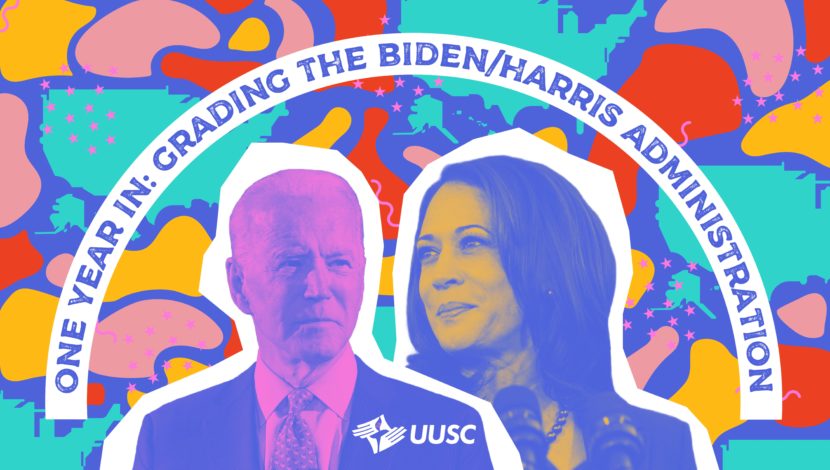The Unitarian Universalist Service Committee advances human rights through grassroots collaborations.
A Report Card on Biden and Harris’ First Year in Office (Part 1)

By on January 20, 2022
In the first of a two-part series, UUSC provides an analysis of the Biden administration’s follow-through on commitments to key human rights concerns during its first year.
You can’t say we didn’t warn him.
Earlier this month, on January 5, we put President Biden on notice that we would be assessing his administration’s performance after one full year in office. Specifically, we look at whether he had made progress toward the human rights goals he pledged to advance, in areas ranging from climate justice to vaccine equity.
The last time we “graded” the president in these areas was back in April 2021, at the conclusion of his first 100 days in office. What we found at the time was that, while the Biden/Harris administration had taken some positive steps, they were still falling short in several areas. We tended to give the benefit of the doubt, however, because we recognized that they were still only a few months into their tenure.
A full year in, alas, we cannot be so lenient. The Biden administration has now had 12 months in which to follow through on their promises. Yet, in one human rights area after another, they have either failed to make progress beyond where they were at 100 days, or they have actually moved backward since then. Our grades reflect these disappointing results. If Biden and Harris want better marks next time around, we include recommendations for what they can do better.
Pandemic Justice (B-)
One of the gravest human rights challenges of our time remains the COVID-19 pandemic. This global public health crisis continues to disproportionately affect countries in the Global South that have been denied timely and equitable access to the vaccine, as well as low-wealth Black, Indigenous and people of color (BIPOC) communities in the Global North who face structural barriers to health care, even as they are more likely to work in frontline jobs at greatest risk from the virus.
Back in April, we gave Biden and Harris a B+ in this area, chiefly because they succeeded in passing COVID-19 relief legislation during their first 100 days. Subsequently, their team also did the right thing by endorsing a global waiver on patent monopolies for vaccine technology, which would enable more low-income countries to save lives from the pandemic.
At the close of the first year, however, the picture is less rosy. Since April, the administration has not pushed for the renewal of key aid programs, despite the fact the public health emergency has not fully abated. Likewise, they have not taken further steps to promote the intellectual property (IP) waiver on vaccine technology that they endorsed. Other rich countries are in large part to blame for this, as they have blocked the IP waiver at an international level. But the Biden administration could get around this opposition, if it chose, by more robustly backing open-source vaccine technology that is accessible to independent manufacturers. We urge them to take this step.
Racial Justice (C-)
A full year into the Biden/Harris presidency, we are still waiting for the administration to advance several of their signature commitments to racial justice. For instance, they pledged to protect the democratic participation and voting rights of BIPOC communities targeted by new voter suppression laws throughout the country; yet bills to achieve this are stalled in Congress. Such legislative stalemates are not the president’s fault, of course, but the administration could do more within the scope of their executive authority to advance racial justice. Specifically, we urge them to take action to rein in unaccountable police departments with a record of violating civil rights.
Recent reports indicate the administration may shortly be unveiling a new set of executive orders implementing long-overdue policing reforms. We urge them to follow through on these plans, including a complete halt to transfers of surplus military equipment to local police forces. With officers around the country involved in grave human rights violations, the last thing the U.S. government should be doing is further militarizing the police.
Also of concern is the administration’s stalled progress on confronting environmental racism (which includes the siting of polluting industries in majority-Black and Brown neighborhoods). While the administration promised to make tackling this issue a priority of its tenure, the recent resignation of a high-level environmental justice expert from the administration calls the depth of this commitment into question.
In part two of the series, we will review the administration’s grades in migrant, climate, and international justice.

